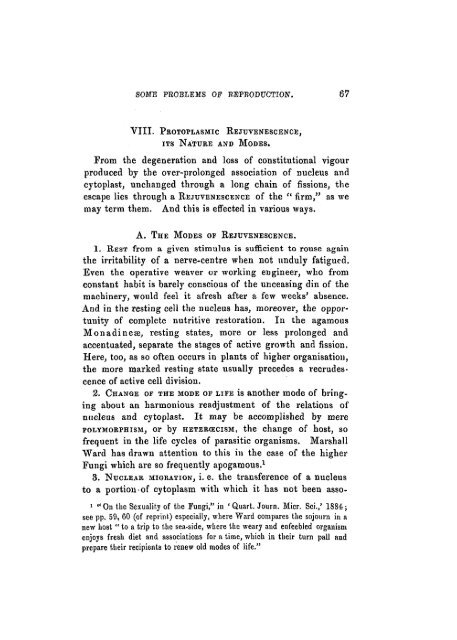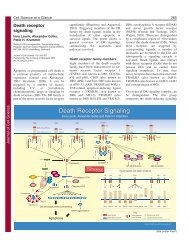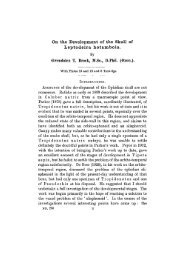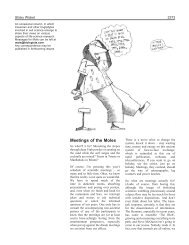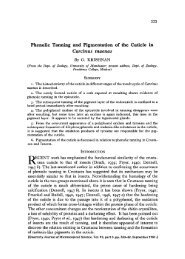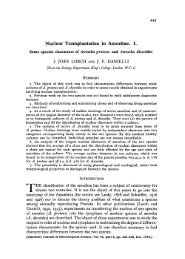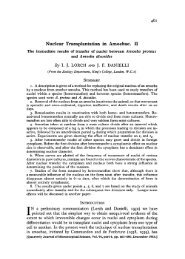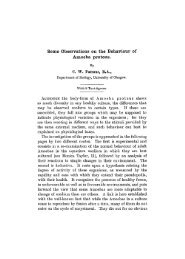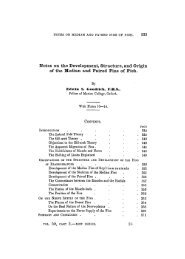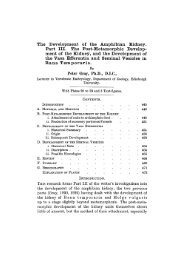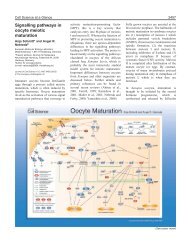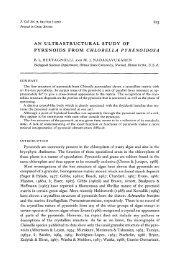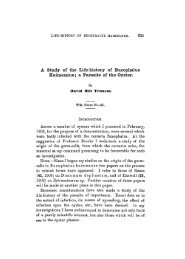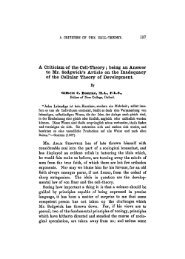Some Problems of Reproduction: a Comparative Study of ...
Some Problems of Reproduction: a Comparative Study of ...
Some Problems of Reproduction: a Comparative Study of ...
Create successful ePaper yourself
Turn your PDF publications into a flip-book with our unique Google optimized e-Paper software.
SOME PROBLEMS OF REPRODUCTION. 67<br />
VIII. PROTOPLASMIC REJUVENESCENCE,<br />
ITS NATURE AND MODES.<br />
From the degeneration and loss <strong>of</strong> constitutional vigour<br />
produced by the over-prolonged association <strong>of</strong> nucleus and<br />
cytoplast, unchanged through a long chain <strong>of</strong> fissions, the<br />
escape lies through a REJUVENESCENCE <strong>of</strong> the " firm," as we<br />
may term them. And this is effected in various ways.<br />
A. THE MODES OF REJUVENESCENCE.<br />
1. REST from a given stimulus is sufficient to rouse again<br />
the irritability <strong>of</strong> a nerve-centre when not unduly fatigued.<br />
Even the operative weaver or working engineer, who from<br />
constant habit is barely conscious <strong>of</strong> the unceasing din <strong>of</strong> the<br />
machinery, would feel it afresh after a few weeks' absence.<br />
And in the resting cell the nucleus has, moreover, the opportunity<br />
<strong>of</strong> complete nutritive restoration. In the agamous<br />
Monadinese, resting states, more or less prolonged and<br />
accentuated, separate the stages <strong>of</strong> active growth and fission.<br />
Here, too, as so <strong>of</strong>ten occurs in plants <strong>of</strong> higher organisation,<br />
the more marked resting state usually precedes a recrudescence<br />
<strong>of</strong> active cell division.<br />
2. CHANGE OF THE MODE OF LIFE is another mode <strong>of</strong> bringing<br />
about an harmonious readjustment <strong>of</strong> the relations <strong>of</strong><br />
nucleus and cytoplast. It may be accomplished by mere<br />
POLYMORPHISM, or by HETERCECISM, the change <strong>of</strong> host, so<br />
frequent in the life cycles <strong>of</strong> parasitic organisms. Marshall<br />
Ward has drawn attention to this in the case <strong>of</strong> the higher<br />
Fungi which are so frequently apogamous. 1<br />
3. NUCLEAR MIGRATION, i. e. the transference <strong>of</strong> a nucleus<br />
to a portion <strong>of</strong> cytoplasm with which it has not been asso-<br />
1 " On the Sexuality <strong>of</strong> the Fungi," in ' Quart. Journ. Micr. Sci.,' 1884;<br />
see pp. 59, 60 (<strong>of</strong> reprint) especially, where Ward compares the sojourn in a<br />
new host " to a trip to the sea-side, where the weary and enfeebled organism<br />
enjoys fresh diet and associations for a time, which in their turn pall and<br />
prepare their recipients to renew old modes <strong>of</strong> life."


